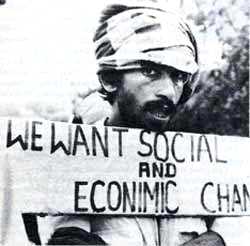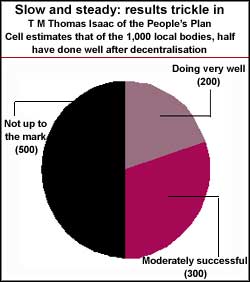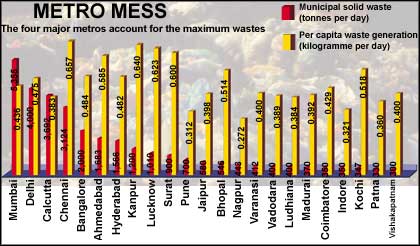
A fig for social concerns
The holy cow of structural adjustments holds supreme sway, leaving the people to shift for themselves

The holy cow of structural adjustments holds supreme sway, leaving the people to shift for themselves

A membership that embraces 25 per cent of Denmark's population more than all its political parties put together gives this organisation an undreamt of social clout

<i> Kerala s income growth rate has increased, among several other positive signs</i>

The increasing fear of losing jobs to cheaper Mexican labour has prompted many Americans to protest the North American Free Trade Agreement.
ABOUT 5,000 gram panchayats in Karnataka will go to the polls on December 16 this year. But some proponents of panchayati raj institutions (PRIs) argue that the 1983 framework for the operation of

Under the 1983 act, the panchayati raj structure consisted of four tiers gram sabha, mandal panchayat, taluka panchayat samiti and zillah parishads. The mandal panchayat and zillah parishad were elected bodies with executive functions. Between these tw
Sonia Nudges Manmohan On Package For Farmers, Women And Tax Breaks Setting the agenda for the government, Congress chief Sonia Gandhi has asked it to focus on farm loans, women-related schemes and income tax slabs in the Budget. During three rounds of deliberations with Prime Minister Manmohan Singh spread over the last week, the UPA chief, sources disclosed, sought to nudge her visitor on what she thinks should be the defining themes of the Budget in an election year. Sonia was keen on a package for farmers and there were already signs to suggest that the PM may have already heeded the advice. Addressing a group of farmers from Punjab asking for debt relief for small and marginal land owners, Singh said, "I would like to assure you that under the leadership of Sonia Gandhi, our government will pay attention to the demands listed in the memorandum submitted.' The Congress chief also made no bones of the fact that the package figures on the top of the "to do' list she has framed for the government. "We know farmers are facing difficult times. I hope, I know Manmohan Singh's government will give due attention to your demands,' Sonia said. Sources rated the chances of a waiver, at least on the interest component, for defaulters among small and marginal farmers as a certainty. As reported by TOI on December 31, the package could cover bad and doubtful loans worth at least Rs 30,000 crore. While the PM refused to get into details citing Budget confidentiality, the government's receptivity to suggestions from political leadership should be happy augury for those expecting a relook at income tax slabs. While the government was expected to push up the exemption limit to Rs 1.25 lakh from Rs 1.1 lakh at present, an upward revision in the tax slab was not being hotly pursued by the finance ministry. An increase in the basic slab of 10% from Rs 1.5 lakh to Rs 2 lakh would cost the exchequer around Rs 5,000 crore and the tax department brass was not keen on foregoing easy money coming its way. Given the enhanced stakes for the party in wooing urban India, the party leadership is hoping that Sonia's prod might cause them to pull out their calculators once again. Delimitation has increased the number of urban constituencies where tax payers constitute a significant slice of the electorate while Delhi, which boasts of the largest number of salaried tax payers in the country, is scheduled to go to polls later this year. The party expects tax concession to help blunt BJP's attempt to reclaim its constituency among the urban middle class. Apart from the plight of farmers, Sonia has also asked the government to focus on schemes aimed at empowering women. She had made this priority plain while on a visit to her constituency last week, and the preference for "gender justice' was repeated during the interactions with Singh. Sources said that among other things, the Integrated Child Development Scheme was likely to be strengthened. sidhartha.kumar@timesgroup.com diwakar.asthana@timesgroup.com POPULAR TOUCH: Manmohan Singh and Sonia Gandhi with a delegation of farmers from Punjab, in New Delhi on Monday
As the UPA government grapples to step up spending on education to 6 per cent of GDP, a commitment made in its governance agenda, a key Finance Ministry official has said accent on primary education will not yield results if not complemented by focus on secondary schooling. Sarva Shiksha Abhiyan (SSA) tantamounts to "fooling ourselves... It (focus) should go to secondary education as well,' Adviser to Finance Minister Shubhashis Gangopadhyay said at a discussion on Budget 2008-09 organised by the Centre for Budget and Governance Accountability here yesterday. SSA is the government's flagship programme for universalisation of primary education implemented in partnership with states. The UPA, in its National Common Minimum Programme, had pledged to raise spending on education to 6 per cent of GDP and at least spend half this amount on primary and secondary sectors. "Whether it is 6 per cent or 8 per cent or 10 per cent. These are just talking points,' Gangopadhyay said, adding that unless the spending gives the desired results it made no sense to talk about percentage alone. He was responding to a query whether the government should revisit its commitment to spend 6 per cent on education, considering the fact that the country's Gross Domestic Product has grown by a robust 8.8 per cent in the last four years. According to the Economic Survey for 2007-08, the government has made a provision of Rs 10,671 crore for SSA. Raising expenditure on education to 6 per cent of GDP was a goal set in 1948 by the Kothari Commission, and reiterated over and again by the National Policy on Education, but successive governments are yet to fulfil it. "You need to spend a minimum of 8 per cent of GDP for education (considering the GDP expansion),' Economist Jayati Ghosh, who was part of an official committee that looked at spending requirement for education, said. "It is very very clear you need very significant expansion. Forget the percentages,' she said, adding that if any government has to really look at meeting the minimum goal on education sector, it has to double the spending. Panelists at the discussion said spending on education has been declining. During the NDA regime, it was 3.6 per cent of GDP and has fallen to 3 per cent now. According to the Economic Survey 2007-08, the achievements under SSA up to September 30, 2007, include construction of 170,320 school buildings, 713,179 additional classrooms, 172,381 drinking water facilities, construction of 218,075 toilets, supply of free text books to 6.64 crore children and appointment of 810,000 teachers, besides opening of 186,985 (till March 31, 2007) new schools. Finance Minister P Chidambaram, in his Budget speech, too had said the focus of SSA will shift from access and infrastructure at the primary level to enhancing retention; improving quality of learning; and ensuring access to upper primary classes. He proposed to increase the total allocation to education sector by 20 per cent from Rs 28,674 crore in 2007-08 to Rs 34,400 crore in 2008-09. Of this, SSA will be provided Rs 13,100 crore.
AS A FRONTIER technology today, genetic engineering is attracting the best scientific minds the world over. The ability to manipulate the genetic make-up of living things has the potential,

External debt has proved an albatross around the neck of African nations. At least two thirds of their total debt will have to be written off if they are to revive their economies

The ministry of nonconventional energy sources is being reoriented to improve efficiency and allow private sector participation to develop the market for its products
THERE are few words in the English language as evocative as population. Most tongues would wag it as something uncontrollable. It also evokes the notion of pressure, of human flotsam spilling over

Prompted by a financial crunch, the ministry of health is considering raising fees in medical colleges to recover costs

The problem of solid waste management is not just limited to the cities

The citizens of Ratlam in Madhya Pradesh continue to put up with a filthy, malodorous town despite a landmark Supreme Court ruling 13 years ago, which held it mandatory for municipalities to provide sanitation facilities.

Union budget 2002 03: all the right noises, all the wrong measures

Hiroshi Nakajima has been re elected director of the World Health Organisation. But the road ahead promises to be bumpy for the controversial Japanese civil servant.

Beleaguered as the Capital's authorities are by increasing demand, large scale wastage and heavy, unsustainable subsidies, the need for a more rational water management system assumes urgency.

Delhi acts tough on diesel vehicles, levies pollution tax

Even as the Clinton administration seeks to phase in a tax on gas, oil, coal and nuclear energy, oil companies complain the levy will damage economic recovery and endanger jobs.